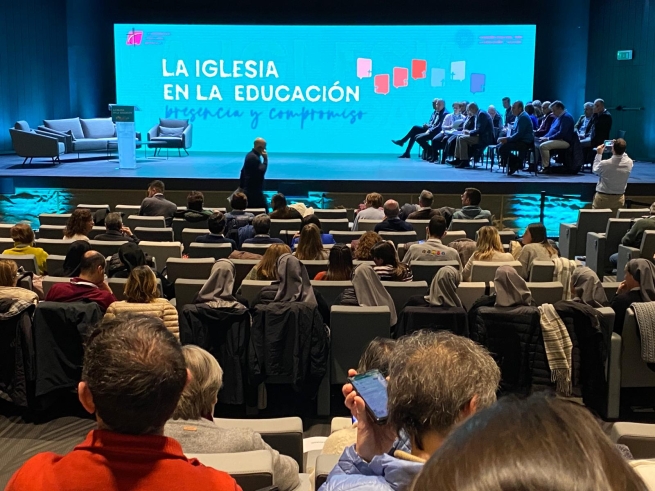The congress was structured in two parts: the presentation of several round tables developed online since October 2023 and the congress itself that took place at the "Pablo VI Foundation" and the "IFEMA" congress centre in Madrid.
The Salesians collaborated with the Vocational Training animation team involving Miguel Esquíroz, General Director of the Don Bosco Tech Foundation in the St James the Greater Province Spain, and as part of this collaboration, in the October round table on Vocational Training, Manu Iribarren, General Coordinator of Salesian Ministry in Pamplona, presented the experience of his centre: "Young people, our protagonists".
As part of the sessions on the experiences of the Schools with the Christian Ideal, the experience carried out by Jóvenes y Desarrollo and the Fundación Bosco Global was presented: "EnRÉDate por la interculturalidad. Transformative citizenship that promotes united, peaceful and inclusive educational communities by 2030".
At the Congress in Madrid, Piero Fabris, Executive Director of Don Bosco Tech Europe, also spoke, who at the end of his address asked: "Don Bosco said that his schools should form good Christians and upright citizens, but if, to increase technical skills more and more, the States ask us to dedicate less and less time to human formation, are we sure to do our best educational work?"
Among the participants, about 1,000 people between the two locations, there was also Fr Óscar Bartolomé, coordinator of the Salesian Schools in SSM and coordinator of the Salesian Schools throughout Spain; three teachers from the Centro Studi Superiori (CES) Don Bosco – Antonio Caño, Rubén Iduriaga and José Luis Guzón, who also participated as Episcopal Delegate for Education of the Archdiocese of Madrid; Mónica Ferrero, Pastoral Coordinator of the Salesians of Lugo; and Diego Pérez Ordóñez, Sports Coordinator of the Salesian mary Help of Christians Province, Spain.
The participants in the Congress were distributed in groups and assigned to the different venues. At the beginning of the day they were welcomed by the president of the Episcopal Conference, Cardinal Juan José Omella, Archbishop of Barcelona, who read the message that Pope Francis himself wrote for them.
"On Saturday morning, after the initial greetings, we faced several challenges for education, with the intervention of several people and the subsequent echo of these reflections by the speakers. With everything that was presented, we selected some challenges (starting from the round tables we had been working on since October) that we voted on at the end of the work. It was an interesting job that will provide ideas to work on ", reported Fr Bartolomé.
For his part, Pérez Ordóñez added: "In my case, I was enrolled in the non-formal sector (because of sport) and although little was said about sport itself, as expected, it was an enriching morning of sharing and listening to the difficulties we encounter. But when we say ‘WE ARE CHURCH’, we are in each of these areas. Some ideas have emerged, such as going out without fear, with volunteers to exercise the public action of the Church. If we do, we will be responsible in our pastoral action. And it should be noted that in the non-formal sphere (in sport, in faith groups, in volunteering...) there is an important educational impact. This makes us reflect on the idea of not leaving the management of these extracurricular activities to external, unknown societies with no Christian identity. Schools and congregations must take the reins of these non-school times."
After three in-depth presentations by Cardinal José Tolentino, Prefect of the Dicastery for Culture and Education; Fernando Reimers, Director of the Master's Degree in "International Educational Policies" at Harvard University; and Consuelo Flecha, Professor Emeritus of the History of Education at the University of Seville, the day ended with the presentation "in a pleasant and visual way, very carefully", of the synthesis of the work of each of the nine areas on which work was carried out: Schools; Teachers of Catholic Religion; Christian Teachers; Special Education Centers; Vocational Training Centres; Universities and University Centres; Higher Schools and University Residences; Non-Formal Education, Volunteering, Free Time and Cultural Projects; and Parish-Family-School.
After a moment of prayer, in the conclusions, Alfonso Carrasco, Bishop of Lugo and President of the Episcopal Commission for Education and Culture, said: "We know that a desirable global educational pact will only be possible by recognizing the centrality of the individual, listening to each other, respecting all those involved and responsible for education, and collaborating loyally within the framework of our society and its legislation. This is also what this Congress wants to contribute to. The Church's presence and commitment to education already has a centuries-old tradition. We want to continue to maintain it in the present and in the future, for the good of our sons and daughters, but also for the good of the whole society, grappling with old and new challenges."
Source: Salesianos.info


